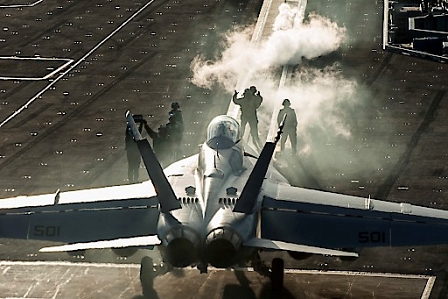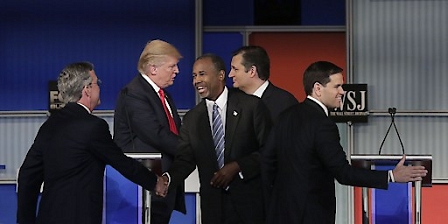Erstellt am: 10. 12. 2015 - 17:10 Uhr
"Threat multiplier?!" Now we’re talking!
It sounds most like a scene from a comedy movie. A small, fiery woman with a thick Brooklyn accent is sitting around table with a dozen burly, well-decorated generals, becoming ever more exasperated as they fail to care about climate change. Like unruly grandchildren, they are only interested in playing with their planes and their tanks, because everything else is boring. Finally, she cracks. "It’s a threat multiplier!" The phrase is the military equivalent of "no more chocolate for you", and it works wonders. All of a sudden the military cares about climate change.
Of course as the director of this little drama I have allowed myself a little artistic licence. Obviously the moment Sherri Goodman coined the phrase 'threat multiplier' to capture the danger that climate change posed did not quite happen like that. Yet it is just as momentous. Generals are not the first people we might expect to care about preventing climate change, particularly in 2007, when George W. Bush was still president and his administration’s stance on the issue can best be summed up as confused.

US Navy/L.A. Preston
As Goodman, who was then Executive Director of the CNA Military Advisory Board, told FM4, she indeed sat around a table with military commanders when she first used the term. As she recalls, it was an effective way to explain that climate change "exacerbates and accelerates a wide range of threats from terrorism to instability." It made military high command sit up and listen because it exactly mirrors the language they use. If a researcher tells soldiers that climate change could be a ‘problem,’ the answer will be that so are bullets, missiles, and boots that melt in the desert. However, have the same researcher tell soldiers it is a ‘threat multiplier’ that will make everything worse, then that’s something any prudent soldier would be keen to stop.
Threats from terrorism are clear enough to people around the world. Threats from instability are vaguer. Primarily, national security advisers in America and Western Europe are worried about the problems climate change could cause to the global water supply and more extreme weather events. These issues could cause wars. The situation is concerning enough that U.S. Pacific Command’s strategy now includes helping Pacific nations prepare to deal with droughts, floods, and storms. Perhaps a soldier in time will save nine.
But it’s not all about strategy. The U.S. military is very important in the fight against climate change for other reasons. Military bases around the world require heating and lighting, soldiers need supplies and transportation, and it almost goes without saying that military vehicles and planes are not usually designed with miles per gallon in mind. U.S. armed forces are the largest consumer of energy in America, having used $20 billion’s worth in 2012. So when they say they are going to cut emissions, there is an awful lot that can be done.

AFP/Joshua Lott
Having the military on side is also symbolically important. Goodman pointed out to FM4 that "the military in the U.S. is deeply embedded in the culture of the country." So the military’s efforts become another stick with which to beat the climate change drum. The views of generals and admirals are likely to have much more sway, particularly for many right-wing Republican voters, than those of scientists and researchers.
Looking at the current race for the Republican nomination, the military’s stance has not caused much change among the party’s ranks. As most of the world eagerly awaits the results of the Paris Climate Conference, Ted Cruz, Jeb Bush, Donald Trump and others are still trying to see the point of it. Yet with national security officials around the world increasingly making strategy to combat climate change, it will become harder and harder for any world leader to ignore. The ‘threat multiplier’ may just lead to multiplicity of solutions.


